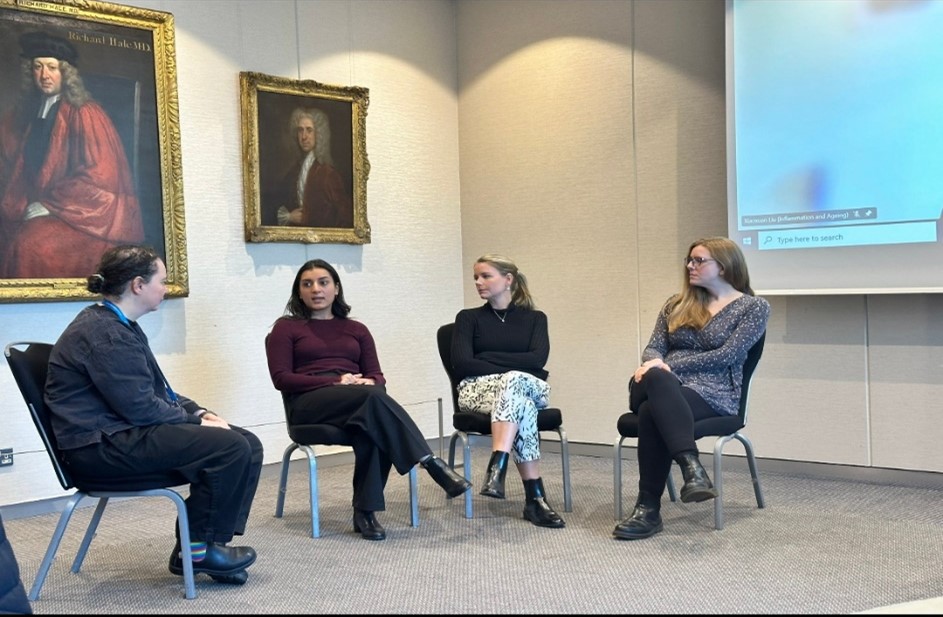Medical leaders come together to work towards a digitally enabled workforce
Read Dr Hatim Abdulhussein's thoughts on his time at the Digital Doctor Event, talking on the future of digital tools in healthcare.
In late November 2023, the NHS Digital Academy and the Academy of Medical Royal Colleges collaborated to host the Digital Doctor Event, a meeting looking to explore the future needs of the medical workforce, understand what skills are needed to thrive in a digital healthcare environment, and discuss strategies to ensure that doctors are prepared for the challenges and opportunities of the digital age. This meeting was held at the Royal College of Physicians in London and brought together healthcare professionals, digital experts, and educators from across the country, with significant representation from the colleges and the NHS.
The event started with a presentation from Professor Adrian Brooke, Medical Director for Workforce Alignment in NHS England's Workforce, Training and Education Directorate. Reflecting on his own journey as a Paediatrician and how he has seen practice change, a highlight was the emphasis on the need for continuous learning and adaptation in the face of increasing complexity in medicine and society. In his talk, Professor Brooke emphasised the importance of looking towards the future and understanding how digital advancements will shape the medical profession. He was followed by Dr. Jeanette Dickson, Chair of the Academy of Medical Royal Colleges (AoMRC) who built on previous thought leadership that had been delivered in this space by the Academy of Medical Royal Colleges (AoMRC), including the Changing the Face of Medicine commission. Dr. Dickson reiterated the need for doctors to be equipped with the necessary digital skills to provide high-quality patient care in the increasingly technologically driven healthcare landscape and set the aims for the day ahead.
The room then had their knowledge measured, as I presented capability statements lifted from the AI and Digital Healthcare Capability Framework and asked those in the room to objectively rate their current proficiency in each area. Dr. Anne Kinderlerer, the Digital Clinical Lead at the Royal College of Physician went on to present key evidence demonstrating variable levels of user experience of electronic healthcare records, and that doctors commonly highlighted the use of technology as one the biggest challenges they face in their daily practice. The morning was ended after a thought-provoking panel of doctors who had built careers in digital health, reflecting on the challenges they faced in doing so, and the lack of structure around training and support for healthcare professionals in digital health. Delegates heard how 2 of the panellists had to leave clinical practice to pursue their interests in digital health because of the lack of opportunities and support within the traditional clinical career path. The candidness of the panellists meant that this session was for many, a highlight of the day.

In the afternoon, Dr. Sarah Clarke, President of the Royal College of Physicians offered her own thoughts on the need to embrace digital technologies in healthcare and the importance of providing opportunities for learning and upskilling for doctors at all stages of their career. Breakout groups were formed, and discussions facilitated on what opportunities already existed to build digital skills within training, focusing on post graduate pathways and opportunities to continue professional development. There was discussion within groups on what skills doctors would need to thrive in a digital environment, and where the training gaps may lie. Finally delegates discussed what levers collectively could enable the change the room wanted to see, and all those that attended made a vow to take back what they had learnt to their own sphere of influence in their clinical and leadership roles, advocating for the development of digital skills and support for doctors to be able to provide best practice and high quality patient care in the digital age.
The meeting offered the opportunity to have meaningful discussions with colleagues from different medical backgrounds and specialties, allowing for a comprehensive exploration of the challenges and opportunities in integrating digital health technologies into clinical practice, and supporting doctors that want to, to develop more advanced skills in informatics and artificial intelligence. There was a sense of progress in the room, and the team involved will be sharing more information on the outputs and key takeaways from the meeting throughout this year, so watch this space. In the meantime, it was a great sense of achievement to see so many passionate healthcare professionals coming together to drive change and embrace the digital revolution in medicine, supported and invigorated by keynote presentations from clinical leaders at the top of NHS England, and the Royal Colleges.
Page last reviewed: 12 January 2024